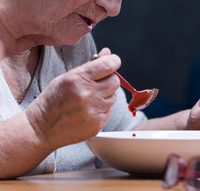What Are The Signs Of Malnutrition And Dehydration In A Nursing Home?

When our loved ones move into a nursing home or assisted living center, we expect that their nutritional, dietary, and medical needs will be met. Nursing homes have trained professionals that must follow countless federal regulations for long-term care facilities, after all. While some potential issues and complications are to be expected, preventable conditions such as dehydration and malnutrition are not among them.
However, these situations can occur even if the nursing home’s staff appear to be diligently serving their residents. This can be due to inadequate staff levels, improper training, poor delegation of tasks, or simple oversight and neglect. In some rare instances, malnutrition and dehydration can stem from active abuse by a provider.
It is critical for both nursing home staff and family members visiting their loved ones to watch for signs of dehydration and malnutrition in nursing home residents. These can include:
Signs of Dehydration:
- Cold, clammy skin (or, alternatively, unusually dry/hot skin)
- Dry mouth
- Lack of tears in eyes
- Extreme thirst
- Severe vomiting and/or diarrhea
- Lightheadedness
- Loss of consciousness
- Reduced or discolored urine (urine that is darker or brown in color)
- Severe vomiting and/or diarrhea
- Stroke
- Weak, rapid pulse
Signs of Malnutrition:
- Unexplained weight loss
- Thinning hair
- Pale skin, lips or mouth
- Weak skin elasticity
- Confusion or disorientation (unrelated to a pre-existing condition such as dementia or Alzheimers
- Swollen arms and lower legs due to edema
- Wounds that heal poorly or take longer to heal
Consequences of either dehydration or malnutrition can include repeated infections, increased susceptibility to illness, poor interactions with medications, diabetes, psychiatric issues, tremors, stroke, and injuries due to falling.
As people age, they become more susceptible to issues like dehydration or malnutrition due to reduced senses of thirst and taste, for example. Medications that have laxative or diuretic effects can also lead to nutritional deficits, and dementia-related issues can interfere with a person’s ability to eat or drink as needed. Nursing home staff are responsible for addressing these potential issues, and family members should be on the lookout in case problems arise.
If a loved one suffers failing health, injury, or worse due to a preventable dehydration or malnutrition issue, they and their family might be entitled to recovery in a court of law. An experienced Tennessee nursing home litigation attorney can review the facts and circumstances to help you plan a path forward. If your family member suffered due to some act of negligence by a nursing home facility or staff, we will make sure your voice is heard.
The Knoxville, Tennessee Nursing Home Litigation Attorneys at Reynolds, Atkins, Brezina & Stewart, PLLC, Can Assist You in a Claim Due to Malnutrition or Dehydration at a Nursing Home
If you suspect or have confirmed that your loved one suffered malnutrition or dehydration at a nursing home facility, you may be entitled to compensation through the legal process. Our attorneys at Reynolds, Atkins, Brezina & Stewart, PLLC, will review all facts and circumstances to determine your best path forward. Contact our Knoxville medical malpractice lawyers at Reynolds, Atkins, Brezina & Stewart, PLLC by phone at 865-500-3121 or online today.
Source:
ecfr.gov/current/title-42/chapter-IV/subchapter-G/part-483

